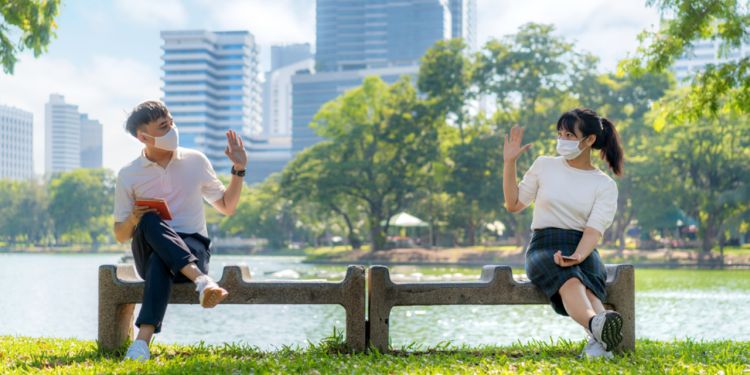
According to a survey by Suan Dusit Rajabhat University in July 2020, 94.51% of Thais are against the idea of allowing foreigners into Thailand in order to prevent a new surge of the COVID-19 pandemic. If you're still looking to relocate to Thailand after the crisis, learn about what's changing regarding entry conditions, employment, housing, lifestyle, etc.
What are the current regulations for entering Thailand?
With a rising number of COVID-19 cases, Thailand chose to keep its borders closed until further notice. However, 11 types of travellers are currently allowed to enter the country. These include the spouses, parents or children of Thai nationals, holders of valid permanent residence permits or residency authorisation, holders of work permits or work authorisations issued by a government agency as well as their dependents, international students already enrolled in an approved Thai university as well as their parents or legal guardians, foreign nationals requiring medical care other than those related to COVID-19 and persons accompanying them, and foreigners with special authorisation from the Thai government in virtue of an agreement with another country. Foreigners on diplomatic or consular missions or for international organisations and government representatives on an official mission as well as their dependents are also allowed to travel to Thailand. However, these travellers are required to fill in specific formalities prior to their departure and on their arrival in Thailand. Besides having a valid passport, they must be in possession of an entry certificate that they can download from the website of the Thai embassy in their country of origin, a health certificate proving that they are not suffering from COVID-19 issued within 72 hours prior to their trip, as well as a health insurance policy with a minimum coverage of $ 100,000 for COVID-19. Upon arrival in Thailand, travellers have to undergo a COVID-19 test before being quarantined for 14 days. Travellers who plan on staying for less than 14 days, on the other hand, are exempt from the quarantine requirement. You are also advised to download the Thai Chana COVID-19 app to keep track of the situation in Thailand. Find out more on the Ministry of Health website.
Have there been any visa changes recently?
Thai authorities will not grant any new visas until further notice. However, foreign nationals who are currently in Thailand must ensure they have a valid passport which is a prerequisite for the validity of their visa. An extension is automatically granted for visas that expired on July 31, 2020. However, expired visa holders are required to regularise their situation at the nearest Immigration office as soon as things get better in Thailand. Resident visa holders who are currently abroad also benefit from a visa extension provided they return to Thailand to renew their visa as soon as the situation improves. For more information, visit the Thai Immigration website or the Ministry of Foreign Affairs website.
Is it easy to find work in Thailand following the crisis?
The COVID-19 crisis had a significant impact on the Thai labour market, with an unemployment rate rising up to 4%. According to official estimates, nearly 10 million people could lose their jobs by the end of 2020. Tourism is the most affected sector with nearly 2.5 million jobs at risk, that is 64% of the workforce. In the rest of the service sector, some 4.4 million jobs are at risk. Add to that 1.5 million (25% of the workforce) in the industrial sector. It's also worth noting that the youth unemployment rate rose to 3.9% during the first half of 2020. Besides, the employment rate is declining in most sectors, except for construction, food, electronics, transport, real estate and public administration. The Thai economy is also expected to shrink by around 4-6%. So if you're looking to work in Thailand, you should probably wait a little longer.
How has the Thai healthcare system performed during the crisis?
Thailand boasts one of the world's best health systems, ranking 6th out of 195 countries in the Global Health Security Index 2019 by the Nuclear Threat Initiative and the John Hopkins Center for Health Security. The country is on its way to becoming a trusted medical hub in Asia, thanks to its high-tech hospitals. Many foreign nationals from neighbouring countries travel to Thailand for their treatment. Thailand relies not only on its highly-qualified doctors and nurses but also on thousands of volunteers who are serving in remote areas where access to healthcare is limited. In Bangkok, for example, public and private hospitals have dedicated more than 1,600 beds to COVID-19 cases, not to mention the 510 beds provided by the hotel and travel industry. Also, telemedicine is allowing the population to benefit from medical consultations and prescriptions remotely. Blood tests, vaccinations, physiotherapy, as well as dressings, some medical examinations and the delivered of medication can be done at your doorstep
Has anything changed regarding universities and schools?
Schools in Thailand reopened in July in compliance with protective measures such as the wearing of masks, and social distancing. Temperature checks are being conducted at the entrance of schools, and a message is immediately sent to parents using a facial recognition device. In classrooms, cubicles have been installed between the desks to guarantee social distancing between the students. Face shields are also given to students during certain activities. Regarding higher education in Thailand, class hours have been reduced. Most universities are relying on e-learning to supplementing courses.
How is the Thai real estate market following the crisis?
In March 2020, the global real estate market dropped by 43%, so you can guess the impact of the COVID-19 crisis on the Thai real estate market as well. In recent years, Thailand has established itself in the Southeast Asian real estate market alongside Singapore and Malaysia. Today, the growth rate of this sector, which usually makes a 6% contribution to the national GDP, has dropped from 5-7% to 3-5%. Interestingly, most buyers in Thailand come from neighbouring countries like Singapore, China and Hong Kong, which have themselves been severely impacted by the pandemic. With hundreds of thousands of new and resale property available in Thailand, you can expect significant price drops over the next few months. The market uncertainty also compelled many foreign owners to resell their property at prices that are well below their initial asking price. If you are currently in Thailand, now might be the time to invest in real estate. Regarding rentals, especially in the capital city, landlords are struggling to find tenants since the border closure and as many expatriates are returning to their home countries. This has obviously resulted in a drop in rent prices. Some tenants are also negotiating their lease with their landlord while others are simply shifting to smaller and more affordable housing.
Has the cost of living in Thailand changed because of the crisis?
The 2.99% drop in the inflation rate during the first quarter of 2020 probably accounts for the lower cost of living in Thailand. According to the Thai authorities, this is the most significant drop in 10 years. Only the prices of locally produced raw foods increased slightly due to the drought. It's worth noting that the government launched a food price reduction campaign during the COVID-19 crisis, with the aim of further reducing the cost of living. Reductions included products like rice, drinks, personal hygiene products, toilet paper, frozen food, etc.
How about lifestyle? Have there been major changes in habits following the sanitary crisis?
Things have practically gone back to normal in Thailand, although social distancing is being respected, and people are wearing masks. Bars and restaurants are crowded on most days, as are supermarkets, shopping malls and leisure spots. Temperature checks and hand are being done almost everywhere, even on major highways and at the entrance to shopping malls and restaurants. People have got used to dining and talking to people with Plexiglas shields al around. Most hotels are relying on contactless technology. Facial recognition devices have been installed not only at the reception but also at the door, elevator, and near trash cans! Besides, the use of mobile apps is much more widespread, especially COVID-19 tracking apps.
We do our best to provide accurate and up to date information. However, if you have noticed any inaccuracies in this article, please let us know in the comments section below.











